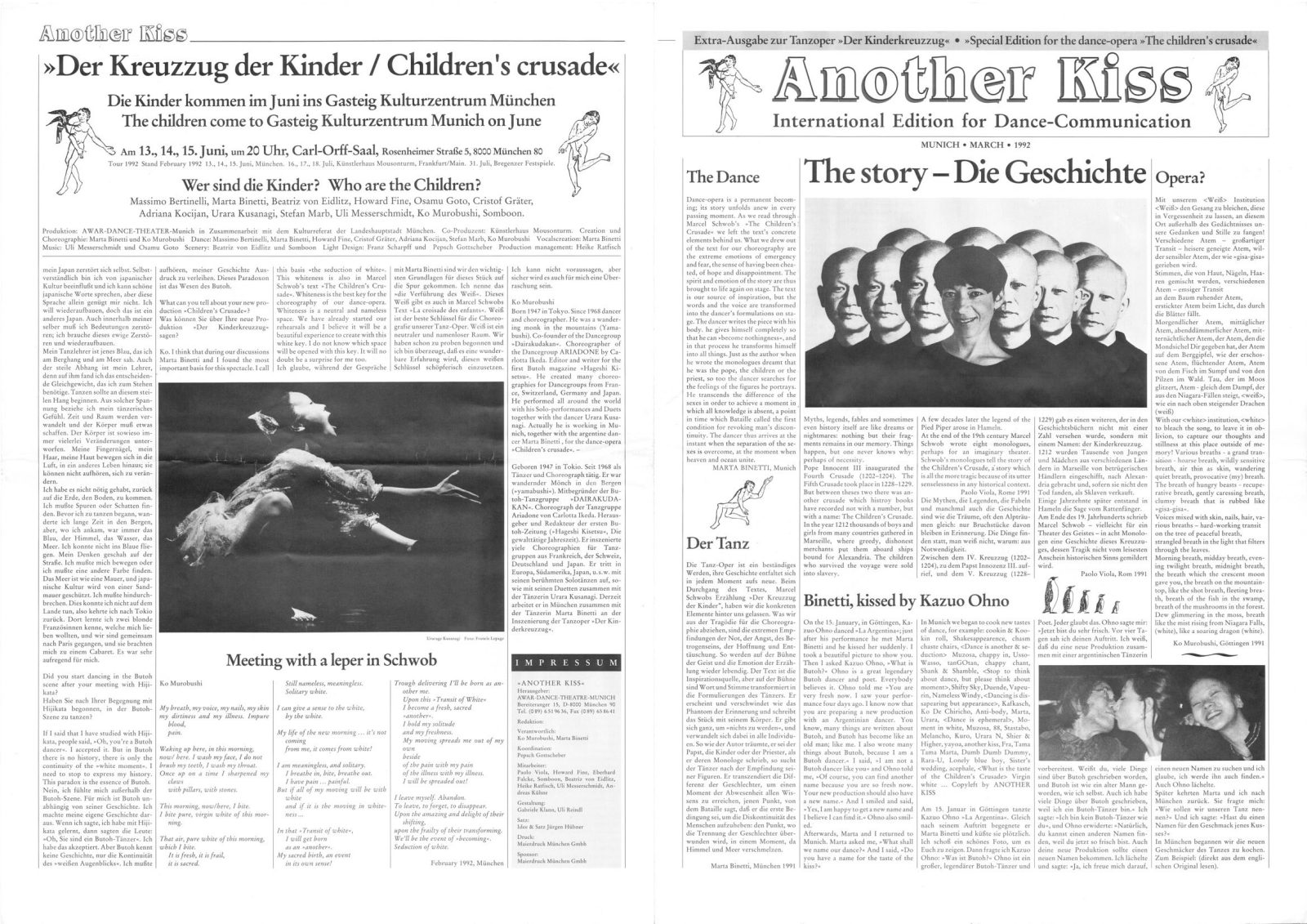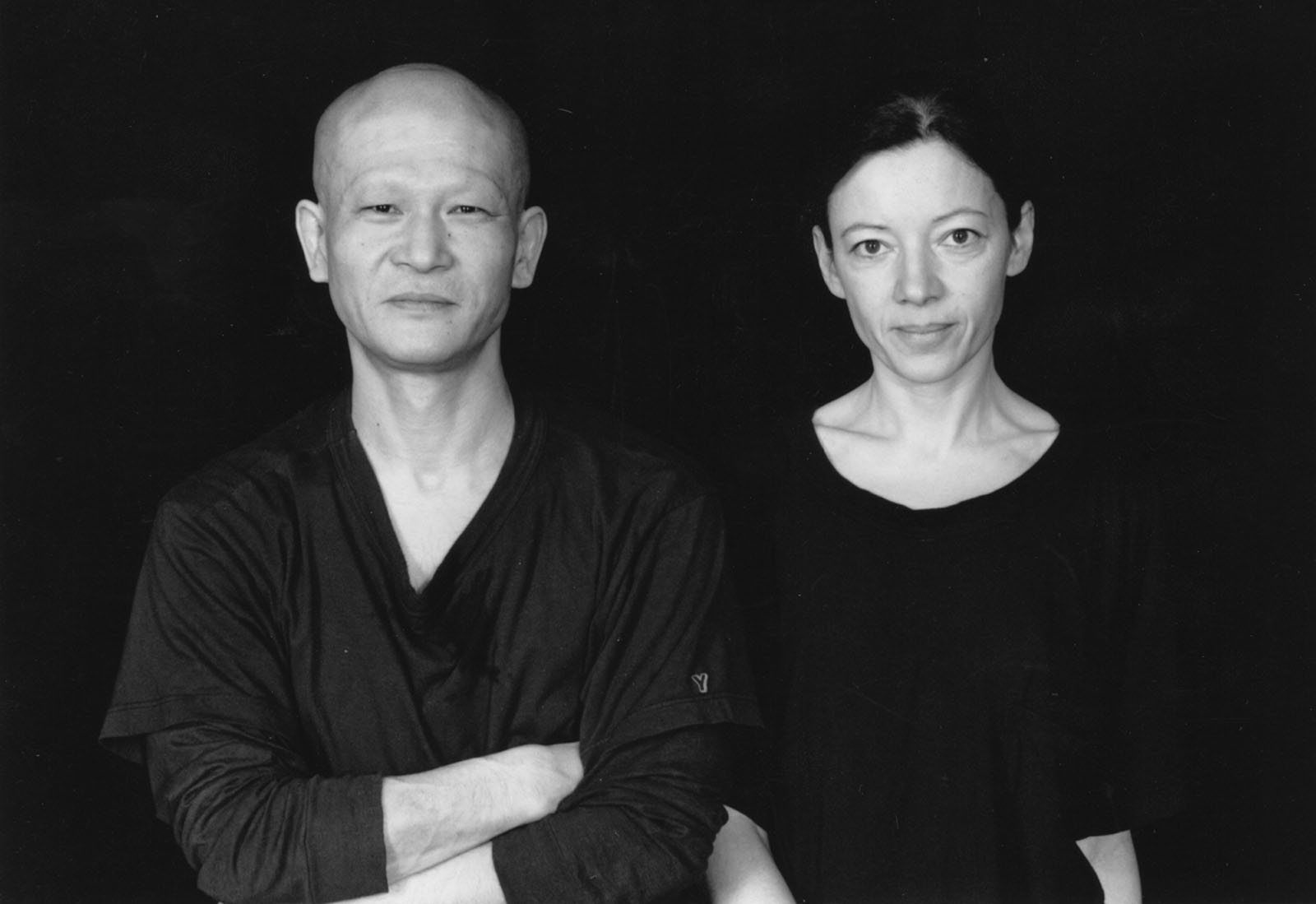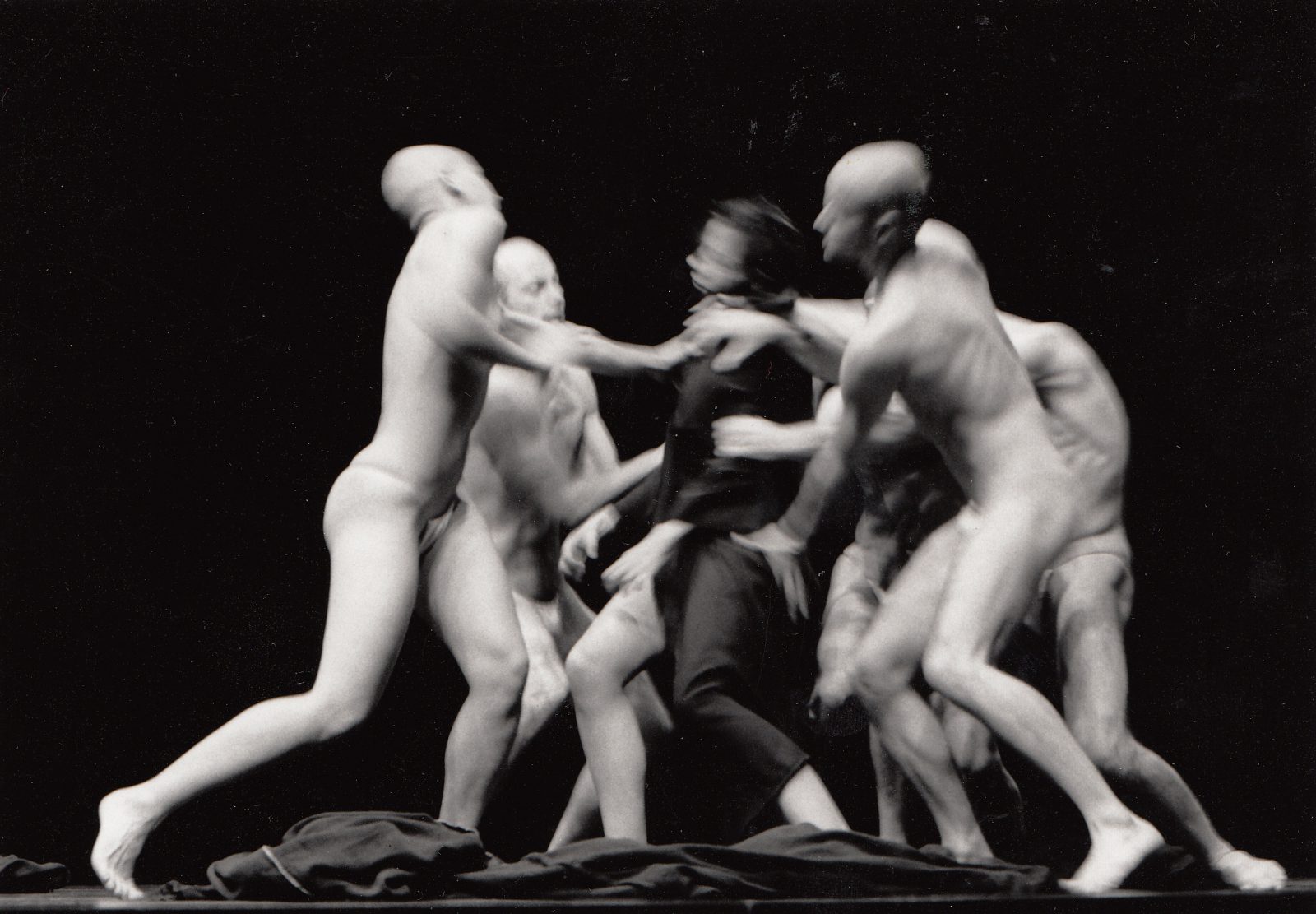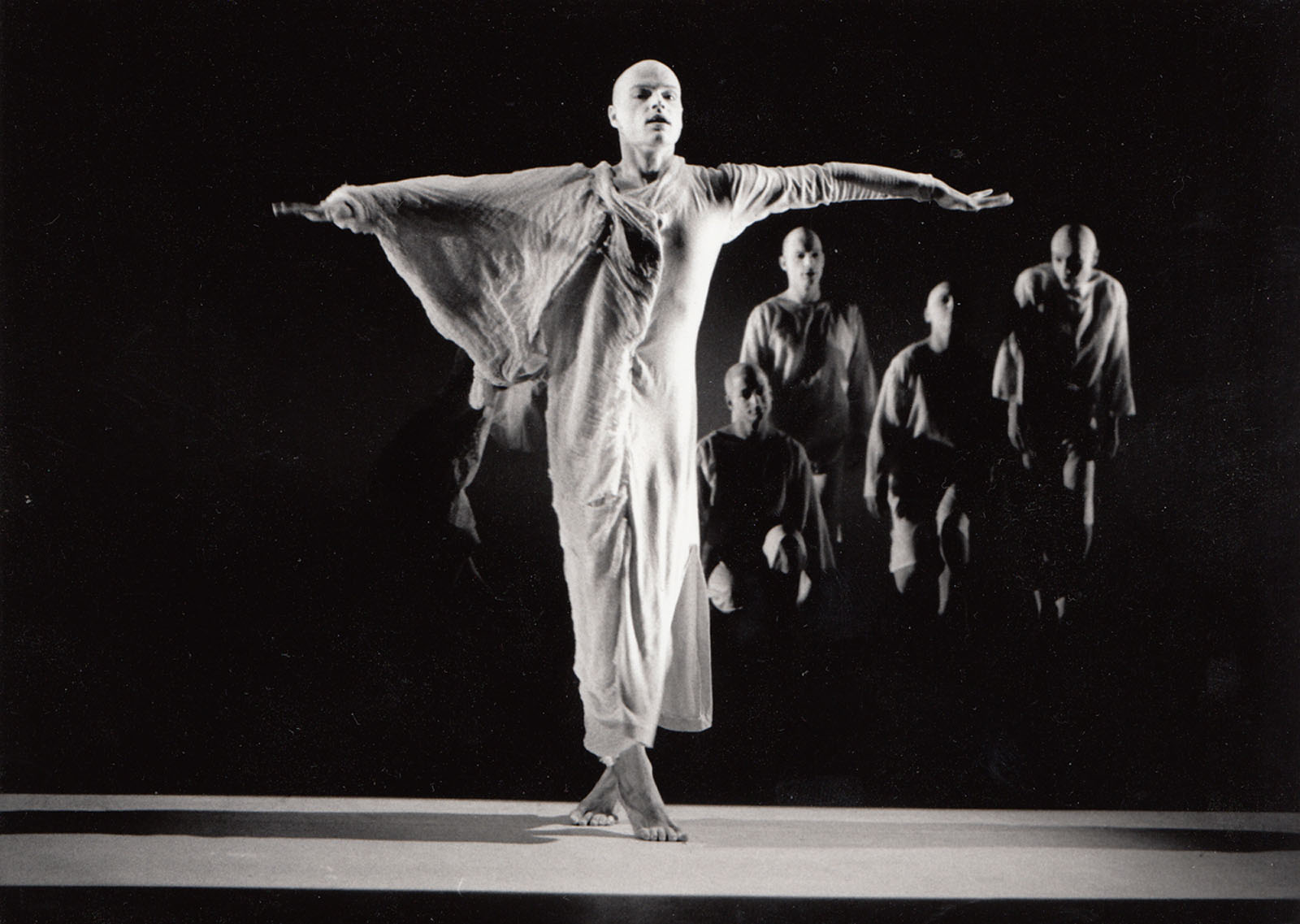.jpg)




1992
from Flyer
A letter from Ko Murobushi
Today I want to talk a lot of…All of my speaking are
are just like our walking, moving, shifting. It’s a step for opening out to the next. Our production, of course, in the Next—Next has no ending—Next is unfinished! So, Children’s crusade will become <a process> by the next.
Life is slow,too slow for me.
We need sometimes to walk slowly, more than life. But I think that our bodies, our emotions, our cells, our anti-body, our crepuscule….
In a word, our body is standing against our own sikness, it is keeping on a fight during our sleep. So, we talk during sleeping (Maggggggmajalalela), because we make snoking like breaking whiste and of course, we break wind in our sleep! Our bodies has another <mother> language no cultures in that extreme fights. For example, we can name four sounds of winds by cultural words. Only our conscious can name and can sleep well with cultures. I’m in Munich and in a same time, at the same place I appear in another time, another place, nameless spaces. And of course already I’m preparing to become a leper!
Present and Next. They have dfferences, but they are touching each other at their heels. I’m in the middle and also I’m edges in the aplits.
Schizogenesis! Ephemeral! Transit!
I Talk very quickly. I should talk more quicker than words.
To forget, to disappear from my culture.
To remember, to appear into my culture.
I should shift, I should bound…
It’s stupid if I remain in one side with my mother language, in the words in community.
I should break my cultural body to talk.
Now, the most beautiful way is a <bi> is a bilingual, is a binary stars, like us!!
We are always speaking in abilabial, we are always moving in a bilateral.
Important thing, there is some Ethic!
Ko is Ko and he is not Ko.
He is a Butoh dancer and he forgets it in a same way he is Japanese and he is a foreigner for Japanese.
This split is not only in Two, in you & me!
To feel, to speak in plural, innumerable directions. With sensitive and wild bodies.
With accidents, by chances.
We will dance and talk <Another Kiss> and always keep on asking
With <four foot>
Where is now/here?
continued next
P.S.: Excuse me, my English is broken. I hope something different, coming out from the breaks. I let my pen with expectations.
−Ko Murobishi−
────
On Many Paths—to Marta Binetti
She is Argentinian and there’s her friend,who speaks German, and there am I, a Japanese man. We talk together, we try to communicate in a language which is strange to us. The grammar and form of our lovely mother tongues reappears, distorted, in the foreign language. Yet here in the place of our encounter, in these moments, a beautiful, valuable, wild language in born.
Thus things confront each other which once were far apart.
Sensitive effort and an indomitable will overcome the boundaries, they evaportate, it begins to flow – a current.
I like that very much.
It makes the present immeasureably lively.
We become children of a <crazy present>.
I don’t dance tango with the goal of searching for goodnesss, beauty or nobility. Likewise in butoh dance, my goal is not to put my body at the service of some intention or other.
I dance to burst every form—even the form of dance itself—from within, to transcend every convention of movement and identity, so that– beyond dance –new currents of energy will come alove.
The dancer burns his own body.
The body is neither an instrument for the portrayal of something nor is it a means to express desires and lusts.
Instead, the body is the place where I shed my name, where a new energy is created in an unknown white room of anonymity.
The stage too, the place where we are active together, opens countless oaths which lead beyond known, existent experiences into regions where old name and concepts are no longer valid.
Munchen 1991
────
The story—Die Geschichte
With our <white> instituteon, <white> to bleach the song, to leave it in oblivion, to capture our thoughts and stillness at this place outside of memory! Various breaths – a grand transition –hoarse breath, wildly sensitive breath, air thin as skin, wandering quiet breath, provocative (my) breath. The breath of hungry beats- recuperative breath, gently caressing breath, clumsy breath that is rubbed like <gisa-gisa>.
Voices mixed with skin, nails, hair, various breaths – hard – working transit on the tree of peaceful breath, strangled breath in the light that filters through the leaves.
Morning breath, midday breath, evening twilight breath, midnight breath, gave you, the breath on the mountaintop, like the shot breath, fleeting breath, breath of the fish in the swamp, breath of the mushrooms in the forest.
Dew glimmering in the moss, breath like the mist rising from Niagara Falls, (white), like a soaring dragon (white).
Gettingen 1991
────
Meeting with a leper in Schwob
My breath, my voice, my nails, my skin my dirtiness and my illnesss.
Impure
blood,
pain.
Waking up here, in this morning,
Now/here. I wash my face, I do not
Brush my teeth, I wash my throat.
Once up on a time I sharpened my claws
with pillars, with stones.
This morning, now/here, I bite.
I bite pure, virgin white of this morning.
That air, pure white of this morning,
which I bite.
It is fresh, it is frail,
it is sacred.
Still nameless, meanings.
Solitary white.
I can give a sense to the white,
by the white.
My life of the new morning …it’s not
coming
from me, it comes from white!
I am meanings, and solitary.
I breath in, bite, breath out.
I have pain…painfull.
But if all of my moving will be with
white
and if it is the moving in whiteness
In that <transit of white>,
I will get born
as an <another>.
My sacred birth, an event
in its own sense!
Trough delivering I’ll be born as an
other me.
Upon this <Transit of White>
I become a fresh, sacred
<another>.
I hold my solitude
and my freshenss.
My moving spreads me out of my
own
beside
of the pain with my pain
of the illness with my illness.
I will be spreaded out!
I leave myself. Abandon.
To leave, to forget, to disappear.
Upon the amazing and delight of their
shifting,
upon the frailty of their transforming.
We’ll be the event of <becoming>.
Seduction of white.
February 1992, Munchen
────
Interview of Ko Murobushi
Q: Why did you begin dancing?
Ko: Because of my isolation. I wanted to become blind and die drowning in the water. I was always another of my culture. I felt that I was not me. Of course I love beautiful Japanese poems and traditions, but I am not “me of beautiful Japan.” I couldn’t forget my solitude and my death, even when I was loving. I couldn’t find a way to communicate with my society. I didn’t want to belong to anything, but I had to find out how to spend, how to consume, how to stop my body. And for what? Yes, of course the body is an excess. My body was the strangest thing for me.
Q: When did you begin to dance?
Ko: It was in the late sixties. I didn’t want to join any political sect, I didn’t want to become a street-artist, but I loved the songs “Street Fighting Man” by the Stones. Finally I tried several performances in the street for the experience. I remember this kind of style at the end of the sixties; it had some political smells. When I made a performance with the sun on the Japanese flag being partially eclipsed by the white moon a friend of mine said to me, “Please stop this kind of action.” He gave me the name Tatsumi Hijikata.
I went to see Tatsumi perform and it was a shock. I read Nietzsche because he always thought with his body, but I couldn’t find a way to study to dance that way. When I saw Tatsumi Hijikata I felt that his dancing was intimately close to my own. Afterwards I went to his studio and I gave my body to him. He brought me to work in his film and he brought me to dance in a cabaret. He never gave me a lesson about Butoh. I learned to dance in the cabaret. A process began in my body.
Q: What do you mean when you say that you are a cultural destroyer?
Ko: There is a gap between Japan and my Japan. When I leave Japan, Japan destroys itself and my Japan destroys itself too. Of course I am influenced by Japanese culture and I can speak beautiful Japanese words, but this language alone is not enough to me. I want to rebuild, but it’s another Japan.I also need to destroy meaning inside me; I need a permanent destruction and building.
My dance teacher is that blue that I saw on the mountainside and at the sea. The steep slope is also my teacher, because on it I find the critical balance I need to stand. Dancing should begin with this steep slope. From that tension I get the feeling of my dance. Time and space become transformed and the body has to create and to encounter. The body is already always undergoing changes. My nails, my hair, my skin are moving into the air, into another life; they cannot stop changing.
I did not need to come back to the earth, to the ground. I needed to find some traces or shadows. Before I began dancing, I walked for a long time in the mountains, but I always arrived at the blue – the sky, the water, the ocean. I couldn’t fly into the blue. I thought on the road. I had to move or slide, I needed to find another color. The sea is like a wall, and Japanese culture is protected by a sand – wall, and Japanese culture is protected by a sand – wall, which I needed to break through. I could not do it when I was in the countryside, so I returned to Tokyo where I met two blonde French girls who wanted to love me and we went together to Paris and they brought me to a cabaret. It was very exciting for me.
Q: Did you start dancing in the Butoh scene after your meeting with Hijikata?
Ko: If I said that I have studied with Hijikata, people said, “Oh, you’re a Butoh dancer.” I accepted it. But in Butoh there is no history, there is only the continuity of the “white moment.” I need to stop to express my history. This paradox is the essence of Butoh.
Q: What can you tell about your new production “Children’s Crusade”?
Ko: I think that during our discussions Marta Binetti and I found the most important basis for this spectacle. I call this basis “the seduction of white.” This whiteness is also in Marcel Schwob’s text “The Children’s Crusade.” Whiteness is the best key for the choreography of our dance-opera. Whiteness is a neutral and nameless space. We have already started our rehearsals and I believe it will be a beautiful experience to create with this white key. I do not know which space will be opened with this key. It will no doubt be a surprise for me too.



